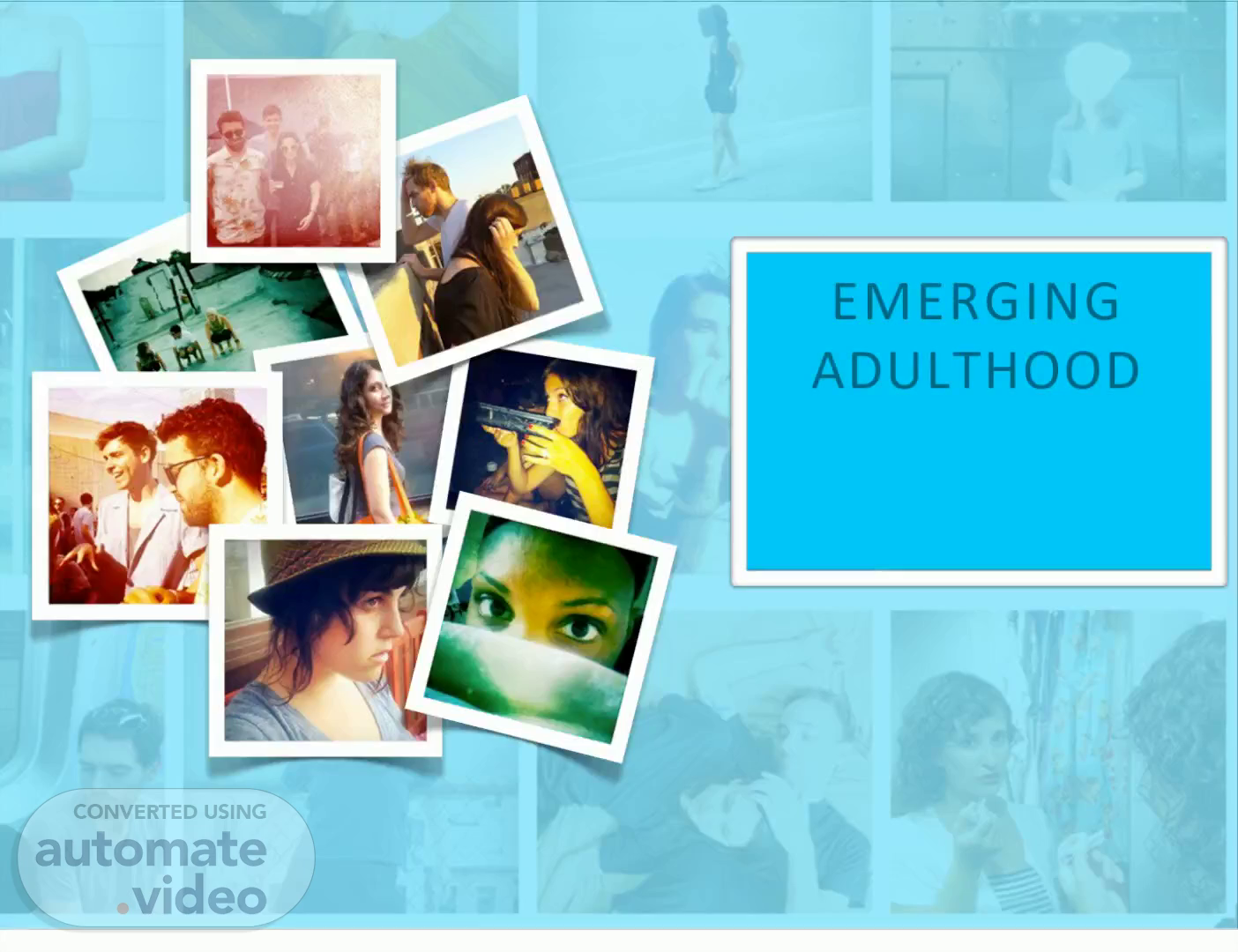Page 1 (0s)
EMERGING ADULTHOOD.
Page 2 (6s)
NEW LIFESTAGE DISCOVERED: EMERGING ADULTS. Defined by Jeffrey Jensen Arnett, psychology professor at Clark University in the 2000s.
Page 3 (27s)
EMERGING ADULT PSYCHOLOGICAL PROFILE. CHARACTERIZED BY self- focus identity exploration a sense of possibilities feeling in- between instability the “age 30 deadline” ambivalence.
Page 4 (40s)
HOW DO WE DEFINE THIS PHASE OF LIFE?. Age: 20- 40 A stage of human development, faced with the hurdle of intimacy vs. isolation.
Page 5 (1m 6s)
DECISIONS AND ACTIONS DURING THIS TIME HAVE LASTING RAMIFICATIONS.
Page 6 (1m 23s)
SELF-FOCUS. The task of “finding yourself” while struggling against someone else’s idea of who you should be requires some focus College students today are 40% less empathetic than those of 30 years ago, with the numbers plunging primarily after 2000 (NYT, 6/10).
Page 7 (1m 38s)
IDENTITY EXPLORATION. The curiosity and desire for self- expression that are part of growing up are especially strong in this generation (Roper, 2009) Identity issues arise in young people’s answers to many different questions, suggesting that these issues are so prominent that they pervade many areas of life (Arnett, 2006).
Page 8 (1m 55s)
A SENSE OF POSSIBILITIES. They have not yet tempered their idealistic visions of what awaits 42% say chances are very good they will achieve “the good life” (Roper, 2009).
Page 9 (2m 7s)
FEELING IN-BETWEEN. 60% say they feel like both grown- ups and not- quite- grown- ups at the same time.
Page 10 (2m 19s)
INSTABILITY. Instability is the hallmark of Emerging Adults’ school and work life “Across the country, the American Dream seems increasingly out of reach. But nowhere is it in greater danger than among today’s unemployed young people, who threaten to become a lost generation” (Huffington Post, 9/24).
Page 11 (2m 36s)
AMBIVALENCE. They are less certain of the. future, yet also more optimistic 96% say they are very sure that someday they will get to where they want to be in life But there is also a distinct sense of dread, frustration, uncertainty, and not quite knowing the rules of the game.
Page 12 (2m 55s)
NEW INSIGHTS AND EMOTIONS FOR BRANDS TO CONSIDER.
Page 13 (3m 9s)
EXCITEMENT VS. UNCERTAINTY. am i takin g t he r ight path ?.
Page 14 (3m 23s)
WIDE OPEN POSSIBILITY VS. CONFUSION. . {. }. g oing to scho ol,.
Page 15 (3m 41s)
RESTLESSNESS AND MOBILITY. 1/3 of people in their 20s move to a new residence every year.
Page 16 (3m 57s)
OPPRESSIVE IDEAS OF SUCCESS. “It’s somewhat terrifying to think about all the things I’m supposed to be doing in order to ‘get somewhere’ successful. When is there time to just be and enjoy? ”.
Page 17 (4m 27s)
COMMITMENT COMING LATER AND LATER. 2009:. 2/3 spend at least some time living with a romantic partner without being married SHIFT IN MARRIAGE AGE 1970s: 21 for women and 23 for men.
Page 18 (4m 52s)
5 TRADITIONAL MILESTONES FOR EMERGING ADULTHOOD. 2.
Page 19 (5m 4s)
FAILURE TO LAUNCH. 40% move back home with their parents at least once.
Page 20 (5m 25s)
BOOMERS HOLD ON FINANCIALLY. American parents give an average of 10% of their income to their 18- 21 year- - old children.
Page 21 (5m 43s)
Emerging Adults are at liberty to pursue more elevated goals since their basic needs of food, shelter and sex are being met.
